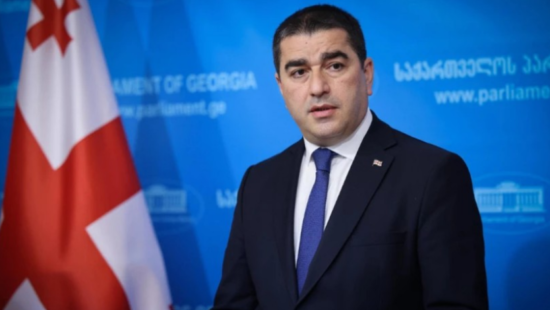“The UK Embassy should respond to facts with facts, not with vague assessments that are completely detached from reality. I call on everyone to stop the anti-Georgian rhetoric,” declared Parliament Speaker Shalva Papuashvili.
According to Papuashvili, the British ambassador violated the Vienna Convention by interfering in parliamentary elections through campaigning against Georgian Dream.
“We speak Georgian, they speak English, and somehow we can’t understand each other. Yet we see the British ambassador is learning Georgian and should supposedly understand something of ours, but we say one thing and they answer something entirely else. I was speaking about very specific issues. I was talking about how the ambassador violated the Vienna Convention by interfering in parliamentary elections through campaigning against Georgian Dream. That’s accusation number one. Let them answer this – say they didn’t violate it and that his statement wasn’t interference. Instead, they say these are false accusations. Educated people don’t conduct such dialogue. The Georgian people have a higher opinion of Britain’s political elite. Therefore, first, the British ambassador violated the Vienna Convention when, ten days before the elections, he publicly engaged in electoral campaigning in the form of an interview against Georgian Dream. We seek clarity on whether, in their view, the Vienna Convention was violated, and if so, what their intended actions are.
Second, the British Embassy attempted to finance individuals with extremist views, and we require an official response to this claim. We also discussed this at the meeting, that this is a false accusation, as if they intended to finance extremism,” Shalva Papuashvili declared.
According to the Parliament Speaker, European values are no longer a measuring standard for some, which is a regrettable phenomenon.
“So we’re not accused of having a Georgian understanding of extremism, I’ll give you the definition from the Oxford English Dictionary of what extremism means. Extremism means: Tendency to be extreme; esp. the holding of extreme political or religious views, or advocacy of illegal, violent, or other extreme measures.
This is extremism, according to the Oxford Dictionary definition, not the Sulkhan-Saba Dictionary.
Now, let’s examine quotes from yesterday’s statements: Tamar Chergoleishvili stated, “The right path is isolation and non-recognition of the regime; therefore, we are joining the election boycott.” Is this or is this not an expression of extreme political views? Is this or is this not support for extreme measures—boycotting and non-recognition of the political process? In other words, is this or is this not extremism? The answer is yes.
Secondly, Gia Japaridze said yesterday, “Our task is to leave them,” referring, presumably, to the government, “in illegitimacy.” Is this or is this not an expression of extreme political views? Is this or is this not support for extreme measures? Of course, it is.
Accordingly, this also constitutes extremism. The British Embassy attempted to finance Chergoleishvili and Japaridze. Therefore, the conclusion is that the British Embassy intended to fund individuals with extremist views. We ask you to provide an answer—are we correct in our reasoning or not? Is the Oxford English Dictionary’s definition accurate, or has there been a mistake—either by the dictionary, ourselves, or both? Please present a reasoned argument.
Furthermore, the vague, threatening rhetoric about potential additional measures does not align with European values. However, since European values are no longer a universal standard for some, I would say this is a regrettable phenomenon,” declared Shalva Papuashvili.
According to him, there are several facts regarding the British ambassador.
“First, the British ambassador violated the Vienna Convention by interfering in the elections through campaigning activities. Second, the British Embassy breached the Strategic Partnership Agreement, including its preamble, which affirms respect for sovereignty. Interfering in elections is, unequivocally, a violation of sovereignty. Third, the British Embassy attempted to finance individuals who are known to promote extremism within Georgian politics. When discussing extremism, we must first recall the very figures I mentioned earlier.
The British Embassy claimed that Chergoleishvili’s Tabula would cover the elections impartially. I also cited Gia Japaridze’s extremist statement. The British Embassy suggested that his NGO would serve as an impartial observer of the electoral process. These are very specific issues.
Let them respond with facts, not vague assessments that are completely disconnected from reality. I call on everyone—this anti-Georgian rhetoric must finally come to an end,” declared Shalva Papuashvili.

